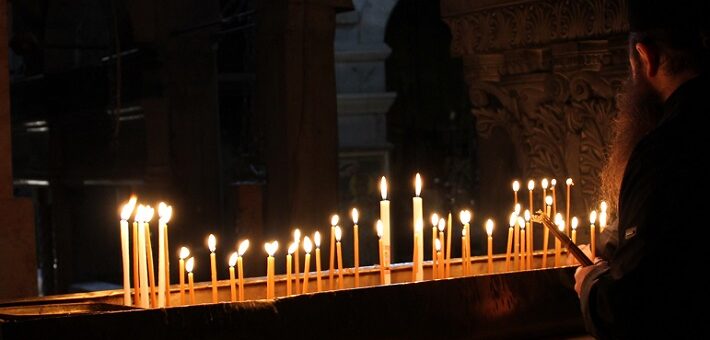Commentary on Psalm 149
I just provided the Working Preacher commentary for Psalm 17:1-9 (see November 6), wryly suggesting that the lectionary conveniently left out the brutal imagery and cursing in that psalm’s last six verses. I can’t make that charge for the Psalm 149 lection; it’s all there! In its second half, “the high praises of God” parallel “two-edged swords” (verse 6), vengeance and judgment burst forth (verses 7-9a), and it is punctuated by the claim that “this is glory for all [YHWH’s] faithful ones” (verse 9b). The striking union of a call to worship and a call to judgment in Psalm 149 might dissuade preachers and worship leaders from using it for All Saints Day. Given the complex history of the church, however, I wonder if the psalm’s content might actually provoke serious theological reflection about the lived experience of the saints through the ages. Although at least two 16th century religious leaders used the psalm to foment violence, its interpretation can nevertheless inform our theology in troubled times.1
The four previous Working Preacher entries on this psalm (links on the sidebar) provide excellent insights into a variety of features, with each scholar emphasizing distinct aspects of its interpretation in light of the overall rhetorical tension. I wish to draw out some implications of Psalm 149’s juxtaposition of joyful, musical celebration with intentioned, vengeful judgment. While we rightly reject simplistic application of the psalm to modern geopolitics, this cannot be the sum and substance of the psalm’s conclusion. In the context of All Saints Day, we find the hope for justice in spite of the undeniably harsh conclusion to the psalm. The following literary and theological considerations can deconstruct our understandable tendency to take the violence at face value.
The psalm’s structure
The violent language and tone of the psalm’s conclusion is only part of the psalm’s overall rhetorical effect. In fact, it is misleading to speak of verses 6-9 as the conclusion if we leave out the final word, “Hallelujah” (which bookends Psalms 145-150). Moreover, while the closing stanza may be harsh on its own, the musical celebration in verses 1-5 comprises over 60% of the psalm. The musical and instrumental vocabulary of the first part outweighs the violent and retributive vocabulary of the second part. Rejoicing outweighs the punishing.
The grammar of “executing vengeance/judgment on”
The word “execute” is the NRSV’s attempt to provide context for the otherwise neutral verb, “to make/do” (‘asah), but the translators have good reasons for rendering the Hebrew of verses 7a and 9a that way. Of the approximately dozen instances of “to do” with terms like “vengeance” (neqamah) or “judgment” (mishpat), most are about enemies being punished (Numbers 33:4; Judges 11:36; 1 Samuel 28:18; Isaiah 48:14; Ezekiel 25:11; 28:26). However, some instances of the combination are decidedly positive, revealing other possibilities for doing justice: God “maintains [the people’s] cause” (1 Kings 8:45, 49; Psalns 9:4; 140:12), and God requires people “to do justice” (Micah 6:8).2 With these intertextual options, are we somehow drawn more to the violent possibilities? Brent Strawn has made a compelling case about how readers can project our culture of violence in the act of interpreting biblical passages. He focused on the conquest in Joshua, but the same tendency to project a more violent meaning than necessary could also happen with the psalms.3
The faithful ones on their couches
An important repetition in Psalm 149 is hasidim, which the NRSV renders as “faithful” (verse 1, 5) or “faithful ones” (verse 9). Coming as it does at the beginning, middle, and end of the psalm, the concept unifies the overall message, or at least holds very different images in tension. What is the meaning of “let the faithful … sing for joy on their couches” (verse 5)? Before the praise in their throats gives way to swords in their hands, the psalm portrays the faithful in utter dependence on God. One scholar studied all of the poetical uses of the term “couches” and found that most occurred in nighttime settings, when people can only sleep or dream. It is a “time of intensified spiritual activity and receptivity.”5 Jason Byasse has noted the strangeness of the faithful’s victory. Evoking the stillness of the Israelites at the Red Sea—“The Lord will fight for you, and you have only to keep still” (Exodus 14:14)—Byasse believes that “Psalm 149 undoes violence rather than furthering it.”5 This posture fits well with other lectionary selections today, especially Luke’s version of the Beatitudes (6:20-31).
From a Christian reading of Psalm 149, the faithful ones are united to the life, death, and resurrection of the Faithful One, Jesus Christ. The psalm’s conclusion seems to identify our glory with the execution of judgment on others, but in Johannine theology, Jesus’ glory is identified with his own execution, his being lifted up on the cross (John 12:27-31). He will ultimately come to judge the living and the dead, as we profess in the Apostles’ Creed, but will it be focused on vengeance and binding with chains, or will the crucified one judge mercifully? Perhaps Tolkien was onto something when he described King Aragorn’s judgment. “The King sat on his throne in the Hall of Kings and passed his judgments” on “many lands and peoples” who had fought for the evil lord Sauron. Aragorn “pardoned” them all, “sent them away free,” and “made peace” with his former enemies.6 So we sing,
“From earth’s wide bounds, from ocean’s farthest coast,
through gates of pearl streams in the countless host,
singing to Father, Son, and Holy Ghost,
Alleluia! Alleluia!”7
Notes
- J. Clinton McCann, “The Book of Psalms,” in The New Interpreter’s Bible Commentary (Abingdon, 2015), III, 726.
- The absence of the preposition bĕ (“in,” “with,”) in these more “positive” uses is important. For Ps. 149:9, the NRSV and several English versions translate the preposition as “on” or “upon” which then matches their verbal translation of “execute.”
- Brent A Strawn, “Projecting on Joshua: You Can’t Worship both God and Glock,” in God and Guns: The Bible against American Gun Culture, eds. C. Hays and C. Crouch (WJK, 2021), 13-37.
- Th. Booij, “Psalm 149,5: ‘they shout with joy on their couches,” Biblica 89 (2008): 107.
- Jason Byassee, Psalms 101-150 (Brazos Press, 2018), 247.
- J. R. R. Tolkien, The Return of the King (Ballentine, 1989), 304-305.
- William Walsham How, “For All the Saints” (1864). Cited from https://hymnary.org/text/for_all_the_saints_who_from_their_labors.


November 6, 2022